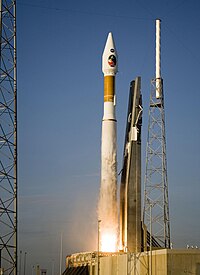Atlas rocket launches ICO G1 satellite
Monday, April 14, 2008

A United Launch Alliance Atlas V carrier rocket launched this evening from LC-41 at the Cape Canaveral Air Force Station in Florida, USA, with the ICO G1 communications satellite for ICO Satellite Management. Lift-off occurred at 20:12:00 UTC. It is the first commercial launch of an Atlas rocket since responsibility for the launches was transferred from International Launch Services to United Launch Alliance, through Lockheed Martin. Launch was completely successful, with the spacecraft separating from its carrier rocket about half an hour after launch.
The Atlas V flew in the 421 configuration, with a 4 metre wide payload fairing, twin solid rocket boosters, and a single-engined Centaur upper stage. It was the 14th flight of the Atlas V, and successfully placed the satellite into a geosynchronous orbit. The launch was dedicated to former Atlas programme employee Lynn Deckard.
ICO G1 will provide S band mobile communications for satellite phones. Its launch had been delayed from May last year, owing to delays with US government missions which were launching on Atlas, and then in light of the failure of a previous Atlas launch in June. It was constructed by Space Systems/Loral, and is based on the LS-1300 satellite bus. It is the heaviest satellite to be launched by an Atlas rocket, and the heaviest single commercial satellite to be launched into a geosynchronous transfer orbit.
Speaking after the launch, Jim Sponnik, the Vice President of the Atlas programme told the team who had conducted the launch that they "all did extremely well and the rocket did exceptionally well". Colonel Scott Henderson, of the 45th Space Wing, United States Air Force, said that the launch was "a great success", and the result of "phenomenal effort" on the part of those involved. David Malcom, the President of Lockheed Martin Commercial Space Systems described the launch as a "hole in one". Tim Bryan, the CEO of ICO Satellite Management told the United Launch Alliance team that he "can't express...what every person in this room has done for our business". He also thanked Bob Day, and ICO's space team, for their work in the build up to the launch. Michael Gass, the CEO of United Launch Alliance said that the successful launch was a "testimony to this entire team", and told flight controllers "congratulations, you're the best".
The satellite's signal was acquired by ground tracking stations in Australia at 21:17, and the launch was confirmed to be accurate to within one nautical mile of the targeted orbit. The next Atlas launch is scheduled to occur in early July, with a DMSP weather satellite, from Vandenberg Air Force Base in California.
Sources
- Justin Ray. "Mission Status Center" — Spaceflight Now, April 14, 2008
- "ELV Countdown Portal" — NASA, April 14, 2008
- "ULA Atlas V launches with ICO-GI" — NASASpaceflight.com, April 14, 2008
- "Live Webcast" — United Launch Alliance, April 14, 2008

